A responsible pet owner will indeed be worried if their adorable pet is not eating. It is normal to be worried when this happened as you cannot know whether they are sick or normal or did something wrong. What to do if your leopard gecko is not eating? Let’s discuss more.
However, you don’t have to be worried as leopard geckos can go for days without eating. Leopard geckos can stop eating for several reasons like too much cold, impaction, visual problems, illness, etc.
The good news is that leopard geckos can go for months without eating and for weeks without water without having to be concerned.
In this article, you will get an insight into what can make your leos not to eat, when you need to start worrying, and ways that you can treat them when this happens.
Contents
- Why Is My Leopard Gecko Not Eating?
- Your Leopard Geckos Is Acclimatizing
- Cold Environment
- Your Gecko Are Bullied, And It is Causing It Stress
- Your Leopard Gecko Has An Upset Stomach
- Your Leopard Geckos Is Impacted
- Your Gecko Is Sick
- Your Gecko Is Injured
- Your Leopard Geckos Is Breeding
- Your Leopard Geckos Is Shedding
- Your Leopard Geckos Is Growing Older
- Your Leopard Gecko Is A Picky Eater
- Your Leopard Gecko Has Vision Problems
- Leopard Gecko Is In Brumation Period
- How To Help Your Leopard Gecko To Start Eating?
- Can You Force Your Leopard Gecko To Eat?
- How Long Can Leopard Geckos Can Go Without Eating?
- When Do You Need A Vet?
Why Is My Leopard Gecko Not Eating?
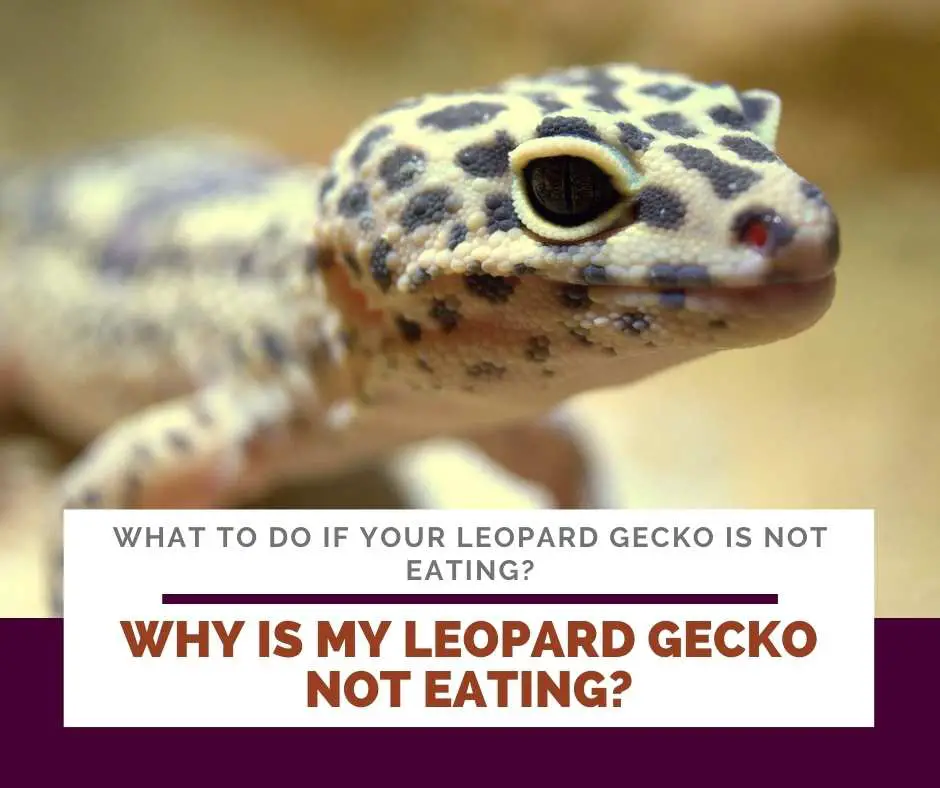
Most reptiles can easily lose their appetites for numerous reasons. Some of the reasons why leopard geckos can stop eating are stated below.
Your Leopard Geckos Is Acclimatizing
It is possible that the baby leopard gecko will refuse to eat if you just brought it home. However, they will get comfortable in their new home within a few days or a week. All you need to do is ensure that their tank has proper temperatures and humidity levels.
If you notice that your leopard gecko spends a lot of time in their hideout. This indicates that they may be scared of you, and you can try to approach their tank. Furthermore, it is best to place the food in their tank instead of feeding them with tongs until they get used to you.
Cold Environment
One of the major reasons why leopard geckos stop eating is because they are too cold. It may be because the heat bulb in their cage has burned out, the heat mat is not working, or there is an insufficient heat source.
This means you need to ensure that their temperature needs are at an optimal level.
You need to ensure that the metabolic rate of your leos does not drop below 70oFahrenheit. You can easily overcome this by making the environmental temperature optimal, and they will start eating once again.
You can also provide them with a simple heat mat to make them feel warm and comfortable while sitting.
Your Gecko Are Bullied, And It is Causing It Stress
Housing two or more leopard geckos together is a recipe for disaster. Leopards geckos are territorial and will bully each other. The stronger or bigger leos will bully the smaller ones in the tank.
This is why you should not house a baby gecko with adults or even together with slightly bigger babies.
The active gecko will get all the food while the weak gecko will get weaker and even stop trying to get food. You can easily solve this by separating leopard geckos with different temperaments or size from each other.
Your Leopard Gecko Has An Upset Stomach
Food can rot inside a leopard gecko’s stomach if the temperature in their enclosure is very low. However, your leos can also have an upset stomach if it eats an insect that has eaten the gecko feces.
This is why it is best to remove insects that can move around the tank once your gecko is filled up.
Leaving crickets or other mobile insects in the tank for days can make them eat leopard gecko’s feces when hungry. The insects might even bite your gecko. However, if your gecko eats insects that have eaten their feces, it can lead to an upset stomach or poisoning.
Your Leopard Geckos Is Impacted
Your gecko has a high chance of gut impaction if there is loose substrate in their terrarium. This is because leopard geckos can lick or ingest sand or loose substrates unintentionally or when eating, causing obstruction or organ rupture.
You need to avoid using sand or loose substrate in your leopard geckos’ tank. You can know if your gecko has obstruction by poor appetite and constipation. If you observe your geckos poop, you will find a loose substrate in their feces.
Your Gecko Is Sick
Your gecko can get respiratory infections if there is a decrease in their environmental temperature. This can then make them stop eating. Although respiratory infection is the most common medical reason why leopard gecko stops eating, there are other illnesses that your gecko can contract.
Once you notice that your gecko is sick, you need to take them to exotic vets to diagnose their sickness.
Your Gecko Is Injured
When leopard geckos are injured or in pain, they can stop eating. Some common injuries to leopard geckos are eye injuries, abscesses, toe and tail problems. Once your gecko is injured, know that it may lose its appetite until the pain is much better.
Your Leopard Geckos Is Breeding
It is normal for female leos to go off food for a few days before they lay eggs. Furthermore, both male and female leopard geckos may not eat when a breeding season starts. They usually concentrate more on finding a mate during this period and may not eat.
Another reason for a female gecko to stop eating during the breeding season is that they are stressed from male leos going after them. You will need to keep male and female separated and only bring them together a few times to mate.
Your Leopard Geckos Is Shedding
If you notice that your gecko skin is becoming pale and white, then it means your leos will shed their skin very soon. However, many leopard geckos will eat only a little or no food a few days before and after shedding.
You don’t have to worry during this period because it is natural and everything will be back to normal after some days.
Your Leopard Geckos Is Growing Older
It is a normal thing for leos to start eating less as they age. For instance, the hatchling and baby gecko will eat every day while juvenile and adult leos will eat once in 2-3 days. This means that it is normal for your gecko and you don’t have to worry about it.
Your Leopard Gecko Is A Picky Eater
One fascinating thing about leopard geckos is that they are picky eaters and will easily get bored if you feed them with the same insects every day. You need to alternate and mix the feeder insects that you offer your gecko every two days to avoid this.
There are instances when your leos will not eat the insect that has bitten them. However, this fear can pass or stay based on your gecko.
Your Leopard Gecko Has Vision Problems
Most leopard gecko’s vision problems can be caused by an incomplete shed and lack of humidity in their tank. Some of the other vision problems associated with leopard geckos are retrobulbar abscesses and corneal ulcers.
If your gecko has vision problems, they will have a hard time seeing their food. This indicates that your gecko does not stop eating, but they cannot see the food they want to eat. You need to take your gecko to the vet once this happens.
Leopard Gecko Is In Brumation Period
The brumation period in leopard geckos usually occurs during the winter months when the temperature and the photoperiod reduces. During this period, your gecko will become less active and will stop eating.
However, you don’t have to be worried when this happens because it is important for breeding leopard geckos.
During the brumation period, leopard geckos will spend most of the day hidden in the cool hide box and sleeping. If you notice that your leos are bromating, it is best to offer it water. You can also offer some light meals once or twice a week.
The brumation period usually starts from November or December and can last to around January.
How To Help Your Leopard Gecko To Start Eating?
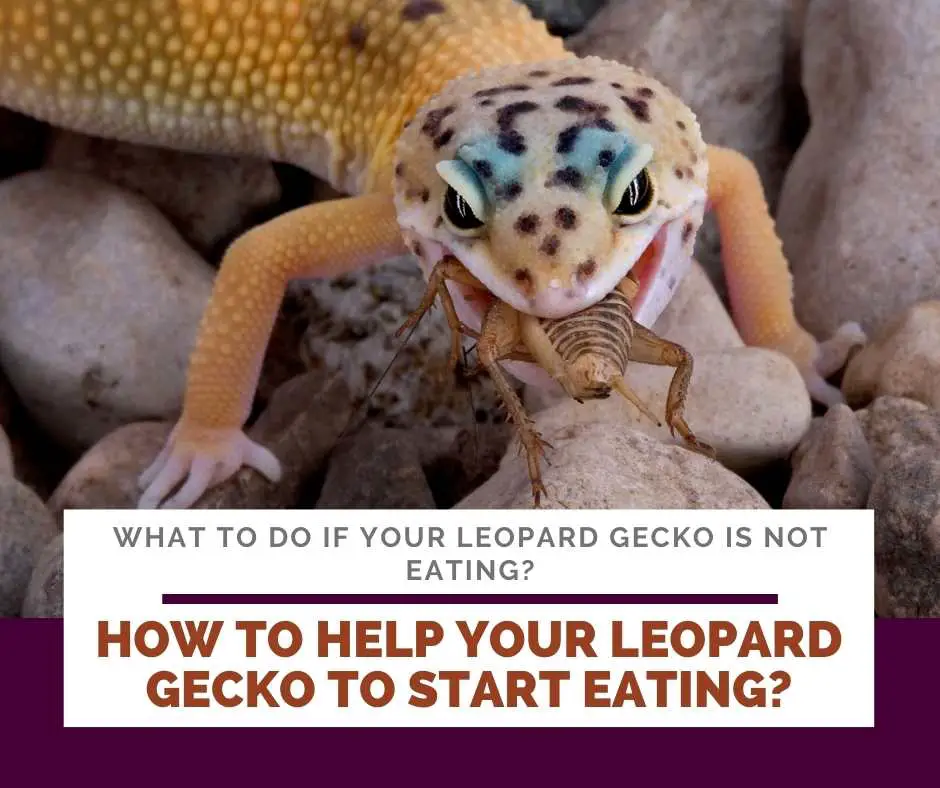
Here are some ways that you can help your leos to start eating again.
Optimize The Temperature and Lighting In Their Tank
Since low temperatures can make leos inactive and lose their appetite. It is best to ensure that the temperature in their enclosure is optimal. The surface temperature needs to be around 90-92 degrees Fahrenheit, and air temperature should be about 78-84 degrees Fahrenheit.
You should also avoid using bright lights in their enclosure, as it can lead to stress. When using lights for heat, you can use the ceramic heat emitters.
House Your Gecko Alone
Leopard geckos are solitary animals, and it is best to house them alone. Having two or more geckos in the same tank can lead to stress, affecting their appetite.
Offer Your Gecko Their Favorite Food
Leopard geckos usually have a favorite food that they love to eat, and giving it to them when they are not eating can easily help pull them out of their anorexic state.
Give Them A Special Formula With A Syringe
You can help starving leopard geckos by giving them gecko slurry, which will provide them with a quick dose of essential nutrients and vitamins. If your gecko does not have underlying conditions, they will regain their appetite once they lick the slurry.
Give Them A Warm Bath
You can help your gecko with impaction by giving them a warm bath. This will help them to pass out the stool to aid their metabolism.
Can You Force Your Leopard Gecko To Eat?
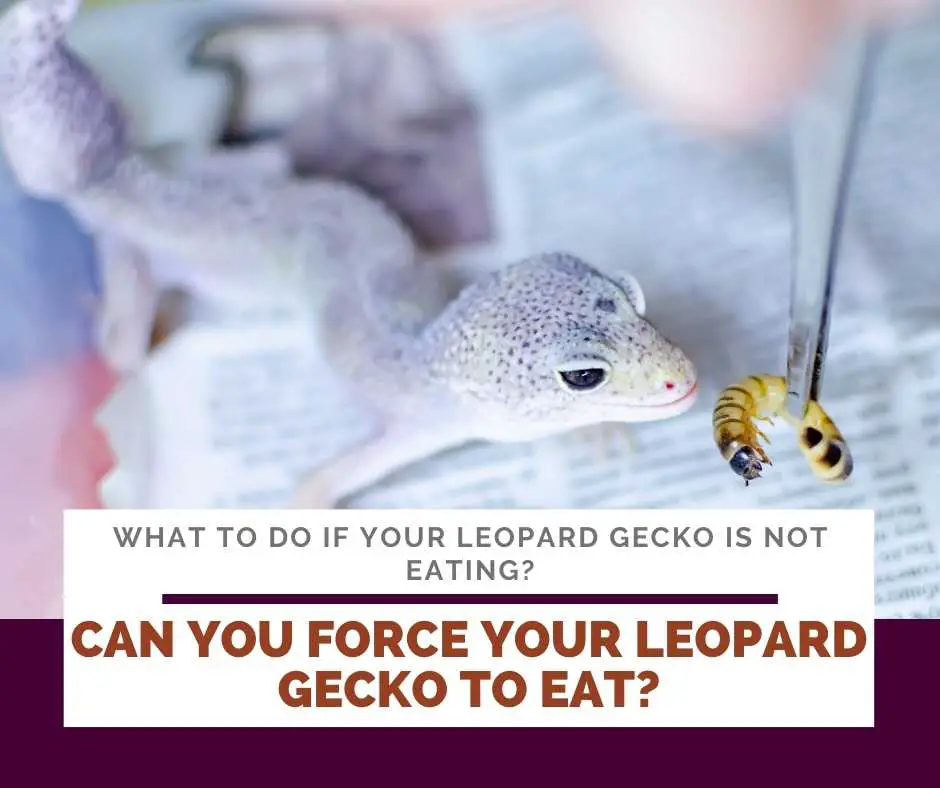
Force-feeding your leopard gecko should only be used as a last resort. Many hobbyists advise not to force-feed your gecko because it will simply stress your gecko and further reduce their appetite.
Even if you plan to do it, it is best not to do it on your own without consulting a vet. If you did not do it right, it could cause grave injuries to your gecko.
How Long Can Leopard Geckos Can Go Without Eating?
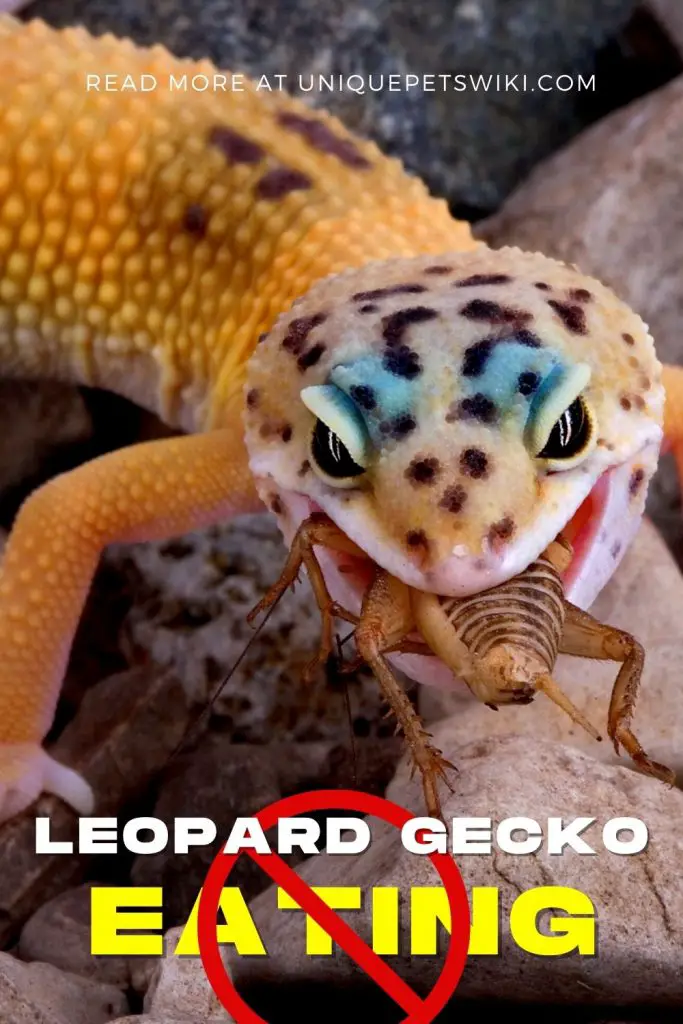
Although leopard geckos can go for some time without eating, it is not ideal for them to starve under normal circumstances. Older juveniles and adult geckos can for two weeks to three months without eating.
However, hatchlings and baby leopard geckos cannot go for long because they need high energy and nutrients to grow. They cannot go for more than two weeks without food and will get sick if they stay for long without eating.
Apart from food, it is ideal that you continuously keep your leopard geckos hydrated as they can only survive for a week without water.
When Do You Need A Vet?
If your leopard geckos tank is under optimum temperature and you notice that your gecko is not eating, you may need to take them to the vet.
If you also notice that your gecko is not behaving normally, have issues with their vision, or are injured, you will also need to visit the vet for diagnosis and treatment.
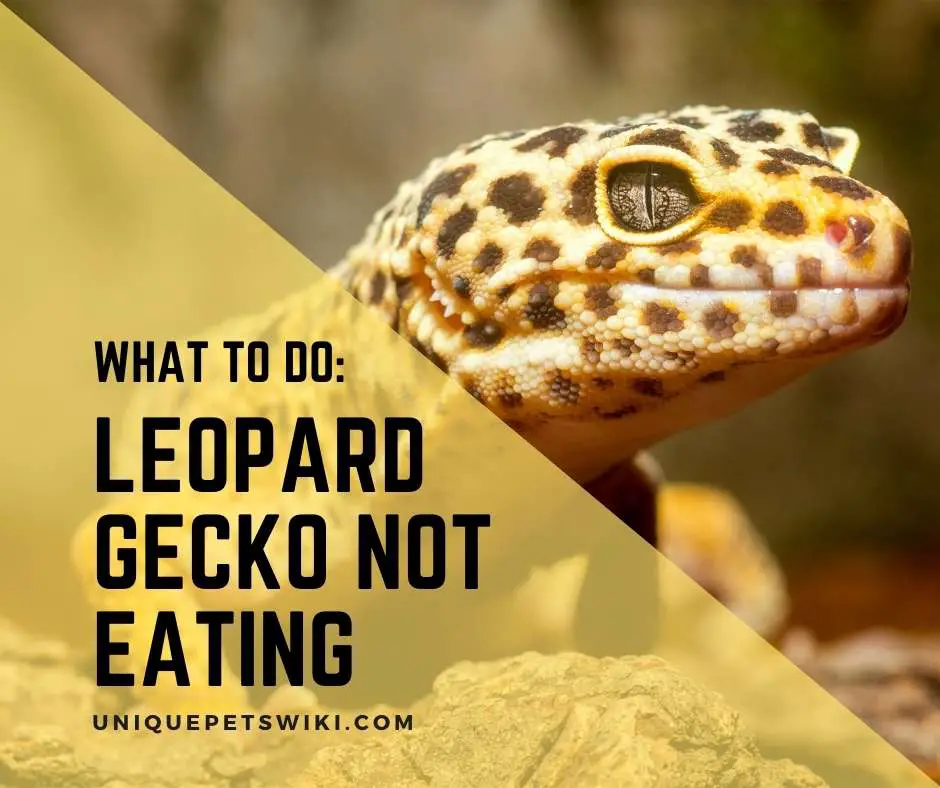
Hi I have recently got a mock snow leopard gecko and he was doing really well eating small crickets and mealworms 3 to 5 total bugs a day then went into shed ate shed and since it’s been about a week and he has not ate is drinking water and is very active but lost all interest in food
You don’t have to worry during this period because it is natural and everything will be back to normal after some days. If your boy won’t eat after around 15 days, please visit your VET.